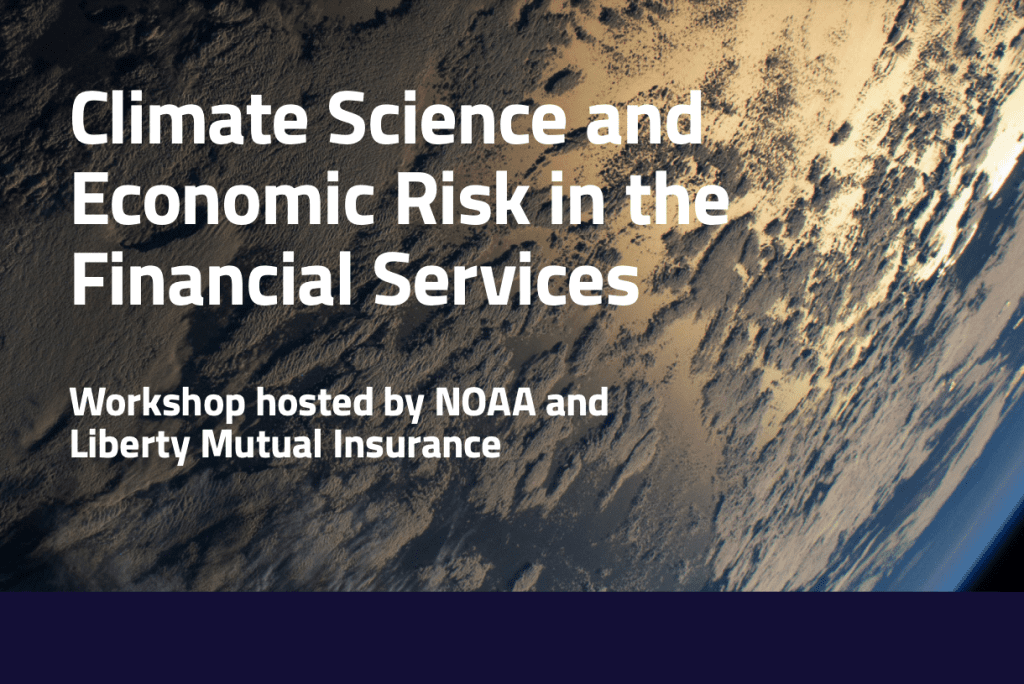Climate Science and Economic Risk in the Financial Services
The IPCC Sixth Assessment Report highlights the need to reduce emissions immediately to mitigate accelerating physical risks. The financial sector has a key role to play in supporting innovation, and in financing the transition to a low carbon economy. However, policy and action need to be informed by an understanding of the availability and usefulness of climate data and considerations of the interconnectedness of financial ecosystems.
NOAA and Liberty Mutual Insurance partnered to host the Climate and Resilience Risk virtual workshop on October 5th, 2021, that brought together key stakeholders such as governmental representatives, climate experts, and insurance, reinsurance, and finance industry professionals to discuss the policy landscape and explore the challenges with respect to climate data and community impacts of climate change.

Read more about this event in our summary.
Videos From The Program
The videos below were captured from the Climate & Resilience Risk Workshop on October 5, 2021.
Please feel free to share these videos with your peer community.
Climate Resilience & Risk Workshop
Rakhi Kumar, of Liberty Mutual Insurance, emceed this workshop and kicks off the event by introducing senior leaders at the U.S. Department of Commerce, NOAA, and Liberty Mutual Insurance who delivered remarks on current and future challenges and seizing opportunities to mitigate them.
Host: Rakhi Kumar, Liberty Mutual Insurance
- Don Graves, Deputy Secretary of Commerce, U.S. Department of Commerce
- Richard W. Spinrad, Ph.D., Under Secretary of Commerce for Oceans and Atmosphere and NOAA Administrator
- James M. MacPhee, Executive Vice President; President, Global Retail Markets, Liberty Mutual Insurance
This panel focused on the current state of climate risk modeling (catastrophe and climate models). It will explore what aspects of climate modeling and forecasting are known and what scientific data can be incorporated into catastrophe models to make them more suitable to assess risks in the mid-and-long-time horizons. It will highlight gaps in climate data, how those gaps hinder resilience planning, and what actions are needed to address those gaps.
Moderator: Steven Bowen, Managing Director and Head of Catastrophe Insight, Aon
- Adam Sobel, Professor, Columbia University
- Sarah Kapnick, Senior Climate Scientist and Sustainability Strategist, JP Morgan Chase & Co.
- Kelly Hereid, Director, Catastrophe Research & Development, Liberty Mutual Insurance
- Thomas Knutson, Senior Scientist, NOAA Geophysical Fluid Dynamics Laboratory
This panel highlighted the interconnectedness in risk financing by drawing links between the identification and pricing of climate risks and the follow-on impact on the financial ecosystem. It explored actions needed by governments and communities to absorb financial impacts particularly on key sources of municipal funding, i.e., bond prices and property taxes, and identify the coordinated actions needed to mitigate the potential impacts by strengthening resilience with a special focus on floodplain developments and natural hazards.
Moderator: Pamela Williams, Executive Director, BuildStrong Coalition
- Emily Robare, Head of ESG for Municipal Bonds, PIMCO
- Carolyn Kousky, Executive Director, Wharton Risk Center, University of Pennsylvania
- Mark Osler, NOAA Senior Advisor for Coastal Inundation and Resilience
- Serena Sowers, VP, Public Sector Solutions, Swiss RE
This panel showcased the breadth and depth of NOAA science and capabilities.
Moderator: Craig McLean, Assistant Administrator for Oceanic and Atmospheric Research
- Ko Barrett, Senior Advisor for Climate
- Harold Brooks, Senior Scientist, National Severe Storm Laboratory
- David DeWitt, Director, Climate Prediction Center
- Jennifer Mahoney, Director, Global Systems Laboratory
The views expressed herein are those of the individual contributors and may not represent the views of the U.S. Government. Nothing herein should be construed as an endorsement of any non-government entities, organizations, or service, or as a formal statement of guidance, or policy position of NOAA or other U.S. Government entities.
Access more climate information resources
Check our the resources below to learn more about how NOAA Research is involved in creating a climate-smart nation.
- NOAA Climate.Gov – provides science and information for a climate-smart nation.
- The Climate Explorer – explore how climate is projected to change in your county.
- Climate Resilience Toolkit – provides tools, information, and subject matter expertise to build climate resilience at the regional and state levels.
- NOAA Resource Guides – provides links to top info sources on these topics:
- Sea Level Rise Viewer – mapping tool to visualize impacts on communiities from coastal flooding or sea level rise (up to 10 feet above average high tides).
- Coastal Inundation Dashboard – provides real-time and historic coastal flooding information at NOAA coastal water level stations.
- Climate Prediction Center – weekly to seasonal outlooks.
- National Centers for Environmental Information – access to comprehensive oceanic, atmospheric, and geophysical data.
- Past weather data – links to individual National Weather Service forecast offices that host past weather data for their region.
- Latest NOAA climate news stories
- FEMA National Risk Index for Natural Hazards – mapping application that identifies communities most at risk to 18 natural hazards.
- DATA.GOV – federal datasets related to climate change.
External Affairs Sub Navigation
Student Opportunities
Finding opportunities for students to join OAR is critical to our success as we build the future of our organization.
Budget
We receive many questions about the timing of the budget process. The timeline is intended as a guide to help explain the process from budget formulation to execution.
OAR Strategy
NOAA Research has updated its Strategic Plan to create a framework aligned with the NOAA 5-year Research & Development Plan released last year.
Climate Workshop
View the latest content from October 5, 2021's Climate and Resilience Risk Workshop in which key stakeholders discussed the climate policy landscape and explored challenges regarding climate data and climate change impacts to communities.